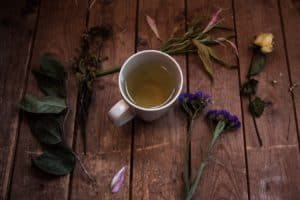Everyone comes down with diarrhea at some point in their life. But no one likes it when it catches you off guard and has you running helter-skelter in search of immediate relief.
Over-the-counter anti-diarrheal medication might be your first thought. It can bring relief in acute situations, but I still recommend using natural remedies instead.
In this guide, I will introduce the best herbal teas for diarrhea and explain how they have helped me. I will also provide scientific evidence about their effectiveness.
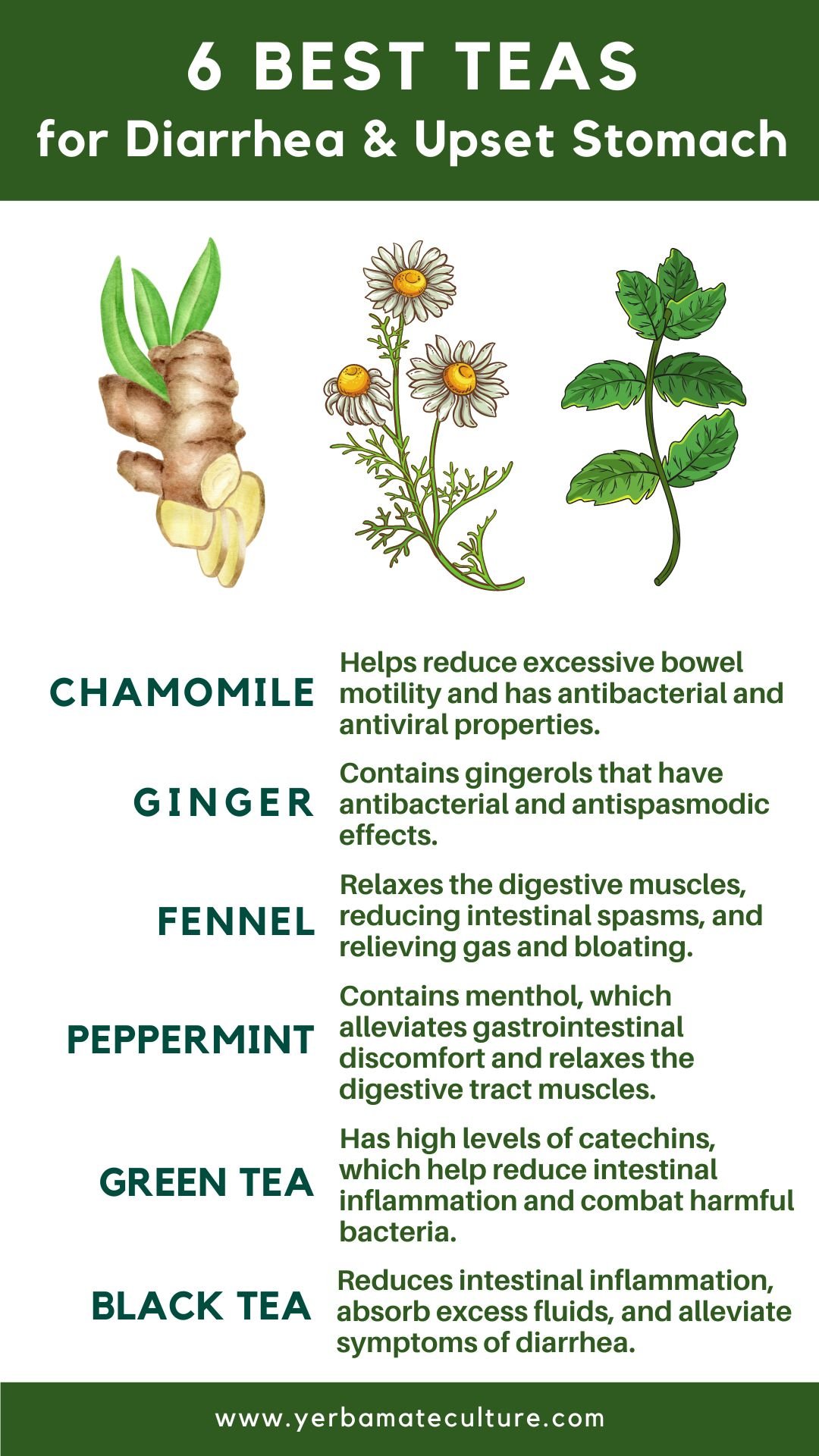
If you are suffering from digestive issues and diarrhea often, I recommend that you try to find what is causing it and address the root issue. In many cases, adjusting your diet and drinking certain herbal teas daily will help you with getting rid of the problem.
In addition to drinking herbal teas, you can drink plenty of clear fluids to keep hydrated and avoid any foods that might irritate your stomach.
At the end of this article, I will share my 5 best tips for avoiding and treating diarrhea.
What Exactly Is Diarrhea?
Diarrhea is a digestive problem characterized by the frequent passing of watery stools three or more times in one day. It often happens because of something you ate.
In most cases, it’s short-lived and resolves itself within 24-72 hours.
Recurring, severe, or chronic loose bowels are usually a sign of an underlying condition, such as an infection, inflammatory disease, or digestive disorder. Treatment may be needed to prevent diarrhea from interfering with daily life functions in these cases.
I recommend that you watch this short video that summarizes the most important facts about diarrhea:
Symptoms Related to Diarrhea
Diarrhea is a symptom itself, but it is usually accompanied by other symptoms, including:
- Bloating
- Abdominal pain or cramping
- Upset stomach
- Nausea or vomiting
- Blood or mucus in stool
- Fatigue
- Dehydration
Common Causes of Diarrhea
Diarrhea may be acute (lasting one to several days) or chronic (lasting weeks or months), depending on the root cause.
Some of the most common causes of diarrhea are:
Foods: Many common foods can irritate or upset your digestive tract and cause loose stools. They include oily and spicy foods and sugar substitutes. Some people keep running to the loo because of food allergies or an intolerance to milk or other dairy foods.
Infections: Bacteria such as clostridium difficile, viruses such as Rotavirus, and parasites may infect the gastrointestinal system. Gastroenteritis, or stomach flu, is a common viral infection that causes severe diarrhea. It spreads through contaminated food or water or by coming into contact with someone who is infected.
Irritable Bowel Syndrome (IBS): This is a common digestive disorder that causes abdominal pain and other stomach issues. Those with IBS-related diarrhea (IBS-D) usually experience frequent and increased loose bowels. Other digestive disorders causing chronic diarrhea include microscopic colitis and celiac disease.
Inflammatory Bowel Disease (IBD): Chronic inflammation is the underlying cause of IBD. Crohn’s disease and ulcerative colitis are the two types of IBD. People with the disease usually experience bloody diarrhea.
Medication/Medical Treatments: Antibiotics and cancer drugs are some of the medications that can interfere with the balance of gut flora and cause frequent bowel movements. Radiotherapy also causes diarrhea in cancer patients.
Stress or Anxiety: Stress and anxiety cause the body to release hormones and chemicals that can enter the gastrointestinal (GI) tract and interfere with digestion. This can lead to diarrhea.
Best Herbal Teas for Treating Diarrhea Naturally
Herbal remedies for diarrhea aren’t a new trend. For thousands of years, Ayurveda and other traditional medicine systems have been using various herbs as well as the tea plant (Camellia sinensis) for relief.
These herbal teas can improve digestion, help stop diarrhea as well as hydrate and nourish your body.
1. Chamomile Tea
Chamomile tea is made by infusing blossoms of the Matricaria recutita plant in hot water. People traditionally drink it to promote sleep. Surprisingly, the delightfully tasting, soothing beverage can also help restore normal bowel movements.
Chamomile’s active compounds include chamazulene, bisabolol, and apigenin. They play a role in providing natural relief for insomnia and relaxing the stomach muscles to reduce diarrhea.

Research Results on Chamomile
A 2014 study confirmed the herb’s effectiveness use as a traditional medicine for diarrhea. It is because chamomile has antibacterial, antiviral, and antidiarrheal properties. This means it can help get rid of parasites and harmful microorganisms that cause diarrhea.
Another study looked at the potential health benefits of chamomile tea for in vitro subjects. The researchers found the herb has antispasmodic and anti-inflammatory effects, which may help reduce excessive bowel motility due to GI inflammation or abnormal stomach muscle spasms.
In my experience, chamomile tea is definitely one of the most effective herbal teas for treating both acute short-term diarrhea as well as recurring diarrhea.
Chamomile tea doesn’t have any caffeine so it’s good for hydrating, doesn’t irritate your stomach, and doesn’t ruin your sleep.
If you are planning on buying some, I recommend that you read my guide with the best chamomile teas.
2. Ginger Tea
Ginger tea is brewed from the rhizome of the Zingiber officinale (ginger) plant. Although it has a slightly spicy flavor, it just might help regulate an overactive intestine.
It’s not surprising since ginger tea has been used for centuries as a remedy for digestive problems such as upset stomach, abdominal ache, nausea, vomiting, and diarrhea.
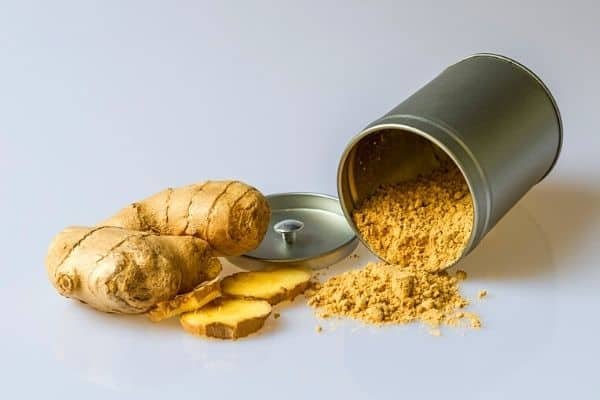
Research Results on Ginger
The main active compounds in this popular culinary spice are gingerols (zingerone) and shogaols. Gingerols and shogaols are potent anti-inflammatory and antibacterial agents that can fight off diarrhea caused by E. coli, contaminated food, or inflammation of the stomach lining, as in the case of IBD.
Ginger’s antibacterial action involves blocking the bad bacteria and preventing fluid from building up in the intestines. Gingerols also have antispasmodic abilities that may help improve the tone of the muscles within the intestine.
The root spice is also thought to be safe and effective for treating nausea related to pregnancy and chemotherapy.
Growing your own ginger is easy. You can use it fresh or dry it in a food dehydrator and then store it in a loose leaf tea container for later.
To make a cup of healing herbal tea, you can use grated fresh ginger root or dried ginger and brew it in boiling hot water for about 10 minutes. To make things easier, just check out this guide with my favorite ginger teas and order some.
3. Fennel Tea
Fennel tea is another one of the best herbal teas for diarrhea and a range of other ailments. Fennel (Foeniculum vulgare Mill) is a perennial herb with yellow flowers. Its seeds are often used in Mediterranean cuisine and various traditional herbal remedies.
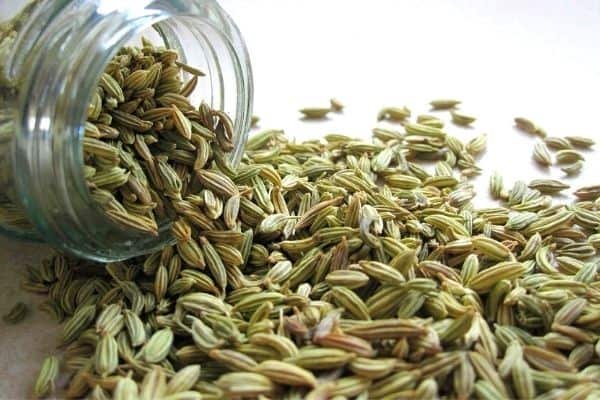
Research Results on Fennel
The plant contains plenty of flavonoids, phenolic compounds, and fatty acids. The most active ingredients are anethole and fenchone. These are powerful compounds that help relieve abdominal bloating, gas, menstrual cramps, and diarrhea.
Fennel possesses a range of pharmacological properties, including analgesic, antispasmodic, antibacterial, and anti-inflammatory. Researchers believe its traditional usage is tied to its ability to reduce muscle spasms.
Brew fennel tea by infusing the dried seeds in boiling water. Expect it to have a natural “sweet” taste with a twist of black licorice and a bitter aftertaste.
4. Peppermint Tea
Peppermint (Mentha piperita L.) is a great herb to have in your kitchen because of its wide therapeutic benefits. That may explain why peppermint tea is one of the most widely consumed herbal beverages.
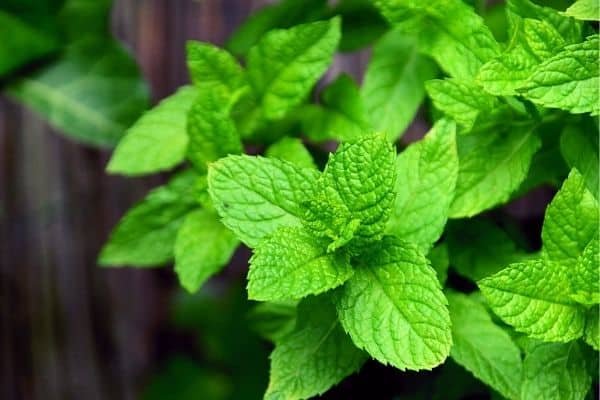
Research Results on Peppermint
Peppermint tea has been used for thousands of years as a traditional remedy for many complaints, including coughs, colds, fever, nausea, anxiety, pain, toothache, indigestion, and IBS.
The main active compounds are menthol and menthone. But the plant also has antibacterial, anti-fungal, anti-viral, antioxidant, antispasmodic, and analgesic effects which help to get rid of diarrhea.
This cool herb may also relieve cramping, pain, and other associated symptoms with bacteria, viruses, and inflammation in the stomach. Studies rate peppermint tea as safe with no reported adverse reactions.
Meanwhile, peppermint oil is has shown to effectively relieve abdominal pain in patients with IBS-D.
You can easily brew peppermint tea from fresh or dried leaves and enjoy its mildly sweet, but minty cool aftertaste. If you want to order some peppermint tea bags, loose leaf products, or blends online, you can find a guide with my recommended mint teas here.
Tea Plant: Best Teas for Diarrhea
Teas brewed with the leaves of the actual tea plant (Camellia sinensis) are usually not considered herbal teas so I decided to discuss them separately.
Green and black teas have been found to be effective for treating certain types of diarrhea but they also contain caffeine, which can actually make diarrhea worse. If you try these teas and feel they aggregate your symptoms, stop consuming them immediately until you get better.
5. Green Tea
Green tea is one of the most well-researched and versatile beverages. Science-based evidence supports claims that green tea can soothe away digestive issues such as bacteria-causing diarrhea and stomach aches.

Research Results on Green Tea
A 2004 study proved green tea to be effective against H. pylori, a bacteria that commonly causes frequent loose stools.
The herb’s beneficial effects are tied to the high levels of catechins (antioxidants) it contains. Catechins demonstrate antibacterial and anti-inflammatory effects on the GI tract that not only relieve but also stop digestive problems caused by bacteria.
Scientists also studied green tea as a potential natural therapy for diarrhea in cancer patients who received pelvic or abdominal radiotherapy. They concluded that drinking 450 mg of green tea per day may safely prevent diarrhea and vomiting in these patients.
Green tea is widely available as dried whole or broken leaves, tea bags, and extracts. Hopefully, your tastebuds can tolerate its sweet, grassy, mild bitter-tasting flavor.
6. Black Tea
Black tea has higher caffeine content compared to green tea and boasts a bold, earthy, woody flavor. Its main active ingredients are catechins, theaflavins, and thearubigin.
Caffeine is known to have some laxative effects, while the tannic acid and other compounds found in black tea may have some healing properties.
So is black tea good for diarrhea or not?
Let’s see what the research says.
Research Results on Black Tea
Black tea has long been scientifically proven to have antidiarrheal abilities.
Its ability to relieve diarrhea is backed by various scientific studies, including research results published by the Journal of Evidence-Based Complementary and Alternative Medicine. The results pointed out that black tea may help treat short-term nonbacterial diarrhea. The tea was shown to significantly decrease the frequency, consistency, and amount of loose stools in pediatric patients between ages 2 and 12.
Black tea extracts also effectively reduced diarrhea caused by a type of E.coli in the gastrointestinal tract.
Summary – How to Treat Diarrhea
Our digestive system is very complex, and when you have issues like diarrhea, it is not always clear what is causing it.
If you have recurring loose bowel movements accompanied by other symptoms like bloating and excess gas, you might be suffering from irritable bowel syndrome. In this case, I recommend that you take a look at my article on the best herbal teas for IBS.
Whether you have a singular case of diarrhea caused by eating food that upsets your stomach or a more chronic condition, you can use the tips below to avoid and relieve the symptoms.
My 5 Best Tips for Avoiding and Treating Diarrhea
- Analyze. First, think about what might be causing your diarrhea. If you think it could be a bacterial infection and the symptoms are severe, you should probably consult a doctor to get antibiotic treatment.
- Foods and Drinks. Avoid oily and spicy foods or anything that you think might cause stomach irritation. Also, avoid drinking alcohol and coffee. Instead, drink water and something with electrolytes (e.g. coconut juice, Gatorade) to keep you well hydrated. Eat something light that is easy to digest, like bananas, toast, and rice.
- Herbal Teas. Consider drinking the herbal teas introduced in this article. If you can’t decide which one would be the best for you, I recommend that you try a mix of chamomile, ginger, and peppermint. It is very effective and super delicious!
- Probiotics. These microorganisms can help with balancing your digestion by increasing the number of good bacteria. You can get probiotics from foods like kimchi, sauerkraut, and certain brands of yogurt, or just buy them as a supplement.
- Digestive enzymes. In my experience, taking natural enzymes before meals can help with digesting foods better and avoiding any stomach problems. My recommendation is Now Foods Super Enzymes available on Amazon.
While herbal teas are widely used and generally safe, more human studies are needed to confirm their full safety and efficacy profile.
If you are pregnant, breastfeeding, or regularly taking medication. Consider asking your doctor before starting to drink herbal teas, as some plants may interact with the pregnancy or the medications you’re taking.
And there are also teas that make you poop. I recommend avoiding them if you have an upset stomach.
I hope that you found this guide useful!
-Joonas





